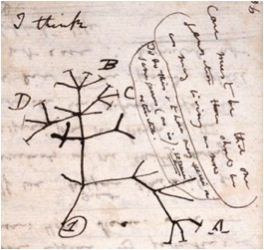‘The Darwins Reconsidered’
Friday, 4 September 2015
9.45am – 6.15pm
 When the 28-year-old Charles Darwin first opened his ‘evolutionary’ notebook in 1837, he deployed the title of his grandfather Erasmus Darwin’s medical treatise, Zoonomia (1794-6). By then, Erasmus — poet, doctor, inventor, leading light of the Birmingham Lunar Society — had drifted into comparative obscurity; best remembered as the eccentric genius whose work The Loves of the Plants (1789) had been notoriously parodied as The Loves of the Triangles.
When the 28-year-old Charles Darwin first opened his ‘evolutionary’ notebook in 1837, he deployed the title of his grandfather Erasmus Darwin’s medical treatise, Zoonomia (1794-6). By then, Erasmus — poet, doctor, inventor, leading light of the Birmingham Lunar Society — had drifted into comparative obscurity; best remembered as the eccentric genius whose work The Loves of the Plants (1789) had been notoriously parodied as The Loves of the Triangles.
Erasmus was never forgotten by his more famous grandson, however, and throughout Charles’s career, Erasmus’s writing and thinking acted as both catalyst and antagonist to Charles’s burgeoning evolutionary ideas, on such subjects as heredity, variation and sexual selection. Forty-two years later, Erasmus was also the subject of Charles’s own venture into non-scientific writing – a biography of his illustrious grandfather.
In the first academic conference to formally consider the imaginative and scientific relationship between these two remarkable speculative thinkers, we ask, in what ways did Erasmus’s life and works facilitate and anticipate Charles’s ideas, and how did Charles mobilise the stated and unstated affinities with Erasmus to enrich his own thinking?
Fifty or so years after his grandfather’s death, Charles Darwin in his ‘On The Origin of Species’ was undoubtedly conscious of and reliant on his grandfather’s ideas and discoveries ; but he showed regrettable timidity, ingratitude and distancing by referring to him and his Zoonomia only once in the book, in a footnote, first put on pages xiii/xiv of the 3rd edition; and then only as to Erasmus being ‘erroneous’ about ‘spontaneous generation’. A sad fact.
LikeLike
Please see my site “Romantic Natural History”
http://blogs.dickinson.edu/romnat/
for information the may prove useful to the conference’s deliberations:
http://blogs.dickinson.edu/romnat/2011/06/07/erasmus-darwin/
http://blogs.dickinson.edu/romnat/2011/06/07/charles-darwin/
LikeLike